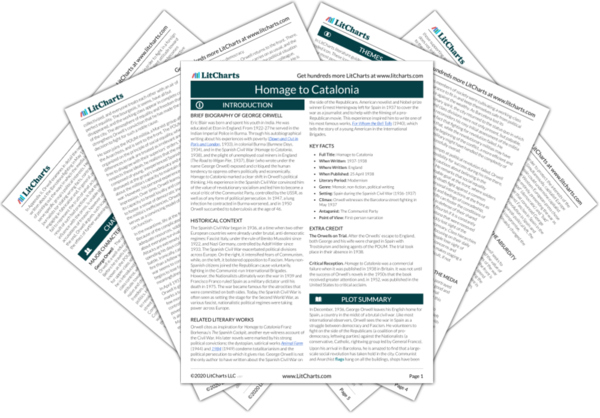In the Spanish Civil War, red flags are meant to represent the Communist Party and The Workers' Party of Marxist Unification (or the POUM), while red-and-black flags represent the Anarchist Party. When Orwell first arrives in Barcelona, the entire city is covered in both types of flags, symbolizing the fact that the city is under leftist, working-class control. At the front, because of the complicated nature of the terrain, flags are used to identify groups and individuals according to their political affiliation, Fascist or Republican. Even in the city of Barcelona itself, flags are crucial to grasping which buildings are controlled by which political group. For example, after the Barcelona street fighting, the POUM flags are torn down, signifying the downfall of that party. Throughout the book, flags serve as a reminder of the insurmountable divisions that exist even within the leftwing Republican coalition itself. Hanging from city’s buildings or flown at military positions at the front, they remind the observer of the grave significance that political parties have taken on—and of the struggle for power that the different political groups are embroiled in.
Red and Red-and-Black Flags Quotes in Homage to Catalonia
Above all, there was a belief in the revolution and the future, a feeling of having suddenly emerged into an era of equality and freedom. Human beings were trying to behave as human beings and not as cogs in the capitalist machine. In the barbers’ shop were Anarchist notices (the barbers were mostly Anarchists) solemnly explaining that barbers were no longer slaves. In the streets were coloured posters appealing to prostitutes to stop being prostitutes. To anyone from the hard-boiled, sneering civilization of the English-speaking races there was something rather pathetic in the literalness with which these idealistic Spaniards took the hackneyed phrases of revolution.

Unlock explanations and citation info for this and every other Homage to Catalonia quote.
Plus so much more...
Get LitCharts A+The workers’ militias, based on the trade unions and each composed of people of approximately the same political opinions, had the effect of canalizing into one place all the most revolutionary sentiment in the country. I had dropped more or less by chance into the only community of any size in Western Europe where political consciousness and disbelief in capitalism were more normal than their opposites. Up here in Aragón one was among tens of thousands of people, mainly though not entirely of working-class origin, all living at the same level and mingling on terms of equality. […] Of course such a state of affairs could not last. It was simply a temporary and local phase in an enormous game that is being played over the whole surface of the earth. But it lasted long enough to have its effect upon anyone who experienced it.
On one side the CNT, on the other side the police. I have no particular love for the idealized ‘worker’ as he appears in the bourgeois Communist’s mind, but when I see an actual flesh-and-blood worker in conflict with his natural enemy, the policeman, I do not have to ask myself which side I am on.
I was in no danger, I suffered from nothing worse than hunger and boredom, yet it was one of the most unbearable periods of my whole life. I think few experiences could be more sickening, more disillusioning or, finally, more nerye-racking than those evil days of street warfare.
In the intervening days there must have been numbers of men who were killed without ever learning that the newspapers in the rear were calling them Fascists. This kind of thing is a little difficult to forgive. I know it was the usual policy to keep bad news from the troops, and perhaps as a rule that is justified. But it is a different matter to send men into battle and not even tell them that behind their backs their party is being suppressed, their leaders accused of treachery, and their friends and relatives thrown into prison.
It did not matter what I had done or not done. This was not a round-up of criminals; it was merely a reign of terror. I was not guilty of any definite act, but I was guilty of ‘Trotskyism’. The fact that I had served in the POUM militia was quite enough to get me into prison. It was no use hanging on to the English notion that you are safe so long as you keep the law.
It was queer how everything had changed. Only six months ago, when the Anarchists still reigned, it was looking like a proletarian that made you respectable. On the way down from Perpignan to Cerbères a French commercial traveller in my carriage had said to me in all solemnity: ‘You mustn't go into Spain looking like that. Take off that collar and tie. They'll tear them off you in Barcelona.’ He was exaggerating, but it showed how Catalonia was regarded. And at the frontier the Anarchist guards had turned back a smartly-dressed Frenchman and his wife, solely – I think – because they looked too bourgeois. Now it was the other way about; to look bourgeois was the one salvation.
A tremendous dust was kicked up in the foreign anti-Fascist press, but, as usual, only one side of the case has had anything like a hearing. As a result the Barcelona fighting has been represented as an insurrection by disloyal Anarchists and Trotskyists who were ‘stabbing the Spanish Government in the back,’ and so forth. The issue was not quite so simple as that. Undoubtedly when you are at war with a deadly enemy it is better not to begin fighting among yourselves; but it is worth remembering that it takes two to make a quarrel and that people do not begin building barricades unless they have received something that they regard as a provocation.












